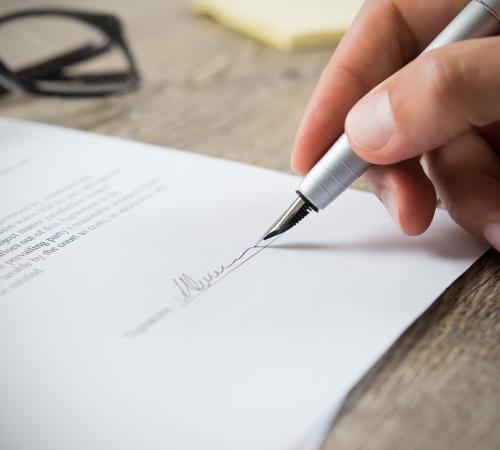

Breaching copyright, whether it’s using somebody else’s work or taking an image from the internet, can lead to a claim against your business. Here, Tim Smith, a partner at BLM solicitors (external link), takes us through the legalities of copyright and how to avoid putting your business at risk.
Whilst the broad idea of copyright as a right belonging to the creator of a literary or artistic work has been around for several hundred years, it really came to the fore with the emergence of printing.
Since then, the right has evolved to protect not only literary works but dramatic, musical and artistic works, sound recordings, films and broadcasts.
As technology has developed to allow people to express their creative ideas in an increasing large number of forms, so the law has evolved to protect the expression of those ideas.
Why does copyright affect your business?
In its purest form, copyright is simply the right to control a work and the reproduction of a work. Generally speaking, the creator of the original work will have the right to control its use for a specific period (up to 70 years in the UK). A breach of copyright takes place when someone uses a copyright work without the permission of the owner of the copyright. Whilst there are a variety of exceptions to this general rule, this is a sensible starting point for businesses to take.
The exposure that businesses have to claims for breach of copyright has increased exponentially with the huge variety of different media through which people are able to express themselves and the ease with which it is possible to find and copy material from the internet. Where material is taken from (or is published on) the internet, complex (and sometimes expensive) jurisdictional issues can also arise.
Any organisation that publishes material or that uses material created by third parties (such as a website, standard form contractual documents, photographs or software) will expose themselves to a risk of copyright infringement.
How can a breach of copyright occur?
Breaches can arise, for example, where photographs are used in a newsletter, video footage is used in a presentation, where an organisation copies another organisation’s terms of business, polices or procedures, where news clips/cuttings are used without the appropriate licences or where music is played on a website.
The law requires a “substantial part” of the work concerned to be copied before an infringement takes place. This has led to a common misconception that a very large amount of material needs to be taken before there is breach. That is not the case.
The courts approach this issue very subjectively and often the question of whether or not the copying is substantial is a matter of quality rather than quantity. A relatively small but important extract from a book or play or even a newspaper headline can attract copyright. In the circumstances it is wise to err on the side of caution.
How can you avoid a breach of copyright complaint?
The majority of breaches of copyright can be avoided. In particular, the following steps will help avoid complaints:
- Where you are using someone else’s material you should ensure that you have their permission to use it.
- Where you are commissioning work from third parties (for example where you ask someone to take some publicity photographs or where you ask someone to develop a website for you) you should ensure, insofar as it is possible for you to do so, that the copyright is transferred to you or that you are granted a licence to use the material which is as broad as possible in terms of the use you may want to make of it.
- Where you are developing material of your own but are drawing on the work of others, every effort should be made to make your material as distinct and separate from the source material as possible. The greater the degree of similarity the higher the risk of a complaint.
- In practical terms, a straightforward ‘sense check’ can be very effective. Asking an independent person who is unfamiliar to compare your material with any source material and give a view as to any similarity can be a useful test. This is, in essence, the starting point for any judge if a dispute were to arise.
In conclusion, the ease with which material can be obtained from the web means that the risk organisations face of falling foul of copyright law have increased dramatically. Making sure that employees are aware of the fact that such material is often protected by copyright and of the need to obtain appropriate licences/permissions will dramatically reduce the extent of the risk as will obtaining the necessary copyright ownership or licence from third party suppliers or, where possible, creating your own original works (relying as little as possible on any external source material).
Professional indemnity insurance is designed to protect against claims of infringement of intellectual property rights like copyright, trademarks or moral rights. Make sure you are covered and get started with an indemnity cover quote from Hiscox. Or, if you’d like to continue researching your options, check our our Indemnity Insurance FAQ Hub. You’ll find answers to queries such as how the cost of professional indemnity is calculated and what level of cover your business requires.
Tim Smith heads up BLM’s Technology, Media and Telecoms team and is recognised as ‘very approachable and extremely knowledgeable’ by The Legal 500 2014. Clients have praised his “mental agility, good humour, clarity and ability to inform without condescension” and his “fine appreciation of the needs of the client and the workings of their industry”.
Tim specialises in defamation, breach of confidence, privacy and data protection. He also advises clients in relation to the Freedom of Information Act. He regularly represents newspapers, magazines and other publishers, broadcasters, authors, sports bodies, charities, professionals (such as solicitors, surveyors, medical professionals and teachers), schools, universities and police forces.
Guest bloggers may post on this site. The views, opinions and positions expressed within these guest posts are those of the author alone and do not represent those of Hiscox or its employees. The accuracy, completeness and validity of any statements made within these guest blogs are not guaranteed and we accept no liability for any errors, omissions or representations or any liability regarding infringement of intellectual property rights. Our social media house rules which also include details on how to contact us about any concerns you have regarding our social media channels, can be found here.
Disclaimer:
At Hiscox, we want to help your small business thrive. Our blog has many articles you may find relevant and useful as your business grows. But these articles aren’t professional advice. So, to find out more on a subject we cover here, please seek professional assistance.






